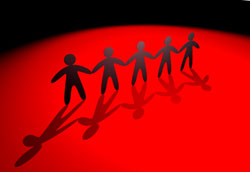Effective Teambuilding: Why Teambuilding
Events Don't Work
Have you ever attended a teambuilding event only to return to work and encounter the same team issues that existed prior to the event? So, why didn't the experience and bonding from the event stick? Why did it have an impact while you were there but little or no residual effect?
Were the participants not committed? Were the event activities lackluster? Was it just "too little, too late" for your team? The answer to all of these could be 'yes.' More likely, though, it's because teambuilding events don't work.
Now, don't get me wrong. I think teambuilding events are great and can be a powerful step towards greater team effectiveness. They are not, however, a silver bullet or magic solution. Building a team is a process not an event.
Are you looking for a one-day silver bullet or are you willing to look deeper at long-term solutions for the challenges your team is facing? If the latter is true, then keep reading.

When I get requests to facilitate a teambuilding event, I begin the process by asking questions. Here are some questions you can ask yourself to begin the process of teambuilding.
* What do the words "teambuilding" and "teamwork" mean to you and in your organization? Teamwork is one of those innocuous terms that mean very different things to different people. Sometimes performance management issues are confused with a general lack of teamwork and teambuilding will not usually help you solve individual performance management issues.
*· What are the current challenges that the group is experiencing?
* What is the source of these challenges, and are they truly teamwork issues?
* What are the environmental factors that may be contributing to the team's current situation (company culture, departmental culture, the management and leadership style for the team, etc.)?
*·What behaviors constitute teamwork for you or your organization?
*·What are the specific behaviors that you want to see displayed?
* How will you know the teambuilding was effective?
A day or two of teambuilding is a great START and can definitely give the team a kick "in the rubber parts". Teambuilding exercises get people thinking about the other individuals in the team and their strengths and weaknesses, they can build more cohesiveness and trust in a relatively short period of time and they can help individuals to consider what behaviors are most effective for optimum team performance.
Recently I facilitated a teambuilding event that utilized the DISC Behavioral Assessment to help participants understand, appreciate and begin to work better with the different styles in the team. One of the participants said, "This is all well and good, but how do we keep what we've learned here going? How do we keep ourselves from slipping back into the same behavior?" I gave a hearty 'AMEN, sister'! This person was seeking a process, not an event.
If you really want to create a highly effective and performing team you must consider a long-term teambuilding plan. Teams aren't just created overnight or via a one- or two-day offsite event.
Here are 5 ways to "keep the music playing" after a teambuilding event:
1. Continue the conversation: Plan follow-up events, discussions, reports or meetings and consider these part of the teambuilding event.
2. Keep it regular: Make room for regular, ongoing teambuilding in team meetings, along with your other business agenda items. As a leader, rotate responsibility to other team members to facilitate the teambuilding activity and increase "buy-in".
3. Commit to it in writing: With the team, create a Team Charter outlining the appropriate behaviors the team will engage in and post it during meetings or in the team's work area.
4. Train the team: Hold periodic skill development training on topics that impact team effectiveness like conflict management, peer accountability, project management or receiving and delivering feedback. Issues like these have a direct impact on a team's effectiveness.
5. Special events: As long as you're also committed to an ongoing teambuilding process, special events are a great way to give the team a "booster shot" and send the message to team members that what is accomplished is as important as how it's accomplished. These don't have to be full days, and they don't have to be focused only on teambuilding. Teambuilding can be mixed in with other agenda items to create a balanced and valuable team development event.
By approaching teambuilding as a process, not an event, you will achieve more lasting change that will have a greater impact on your team's effectiveness and ability to produce results.
About The Author:
Bill Burtch, SPHR, ACC is the President of Harmony Coaching & Consulting a management consultancy focusing on Human Resource
Management, Training Design & Delivery and Executive/Corporate Coaching. Bill makes learning and development FUN! For more
information on this topic or for information on Bill's services you can contact him at 901-272-7390,
bburtch@harmonycc.net or visit him on the web at http://www.harmonycc.net.
|